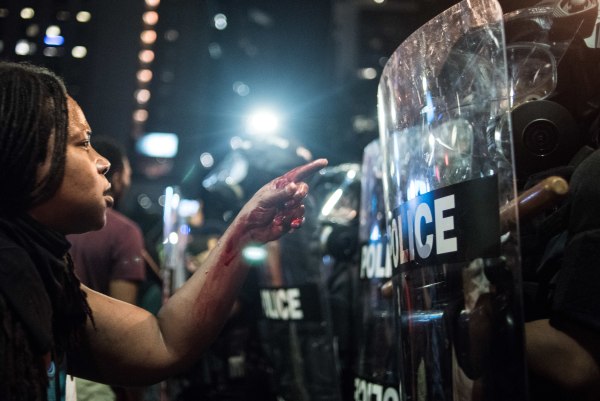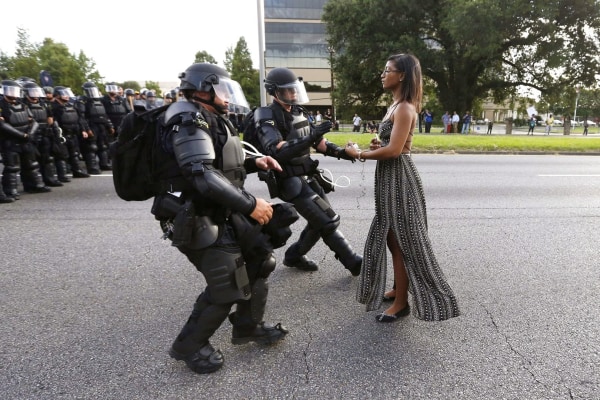By
NBCBLK, May 8, 2017 —
Bree Newsome snatched down a Confederate flag at the South Carolina Statehouse. Ieshia Evans calmly faced down officers in riot gear at a Baton Rouge march.
Widely published photographs of these and other black women offer some of the most arresting images to emerge from the protest movement of recent years.
“We as feminists of color … have been involved in building these movements over the decades, but we have never been acknowledged as leaders,” said Barbara Smith, co-founder of the Combahee River Collective, an early and influential black feminist group.
Unlike many of their predecessors from previous decades, this generation of black women is “demanding that they be respected. They can assert that publicly and have impact and visibility, because of all the movement work that has come before,” Smith said.
Newsome scaled a flagpole in 2015 to tear down the Confederate banner in the aftermath of the attack at a Charleston church where a white supremacist shot nine worshippers to death during a Bible study. Evans acted last summer after the police killings of two black men — Philando Castile in a suburb of St. Paul, Minnesota, and Alton Sterling in Baton Rouge. Images of both women become powerful emblems of protest and unrest.

With blood covering her hand and arm, a woman points at a police officer on September 21, 2016 in Charlotte, NC. The North Carolina governor has declared a state of emergency in the city of Charlotte after clashes during protests in the city in response to the fatal shooting by police officers of 43-year-old Keith Lamont Scott at an apartment complex near UNC Charlotte. Sean Rayford / Getty Images
Historically, black women have been no strangers to the quest for social change. Sojourner Truth was a leading abolitionist. Ida B. Wells led a crusade against lynching during the early 20th century. Fannie Lou Hamer demanded voting rights in the 1960s. Black women founded the Black Lives Matter movement.
But they have often been overshadowed — during the suffragette movement by white women who relegated them to the rear during marches and put their own rights first, and by the black men lionized during the civil rights movement.
“You can find that overshadowing throughout all these movements until very recently,” said Jelani Cobb, a historian and journalism professor at Columbia University. “These movements that were trying to achieve democracy were not always functioning democratically.”
A new era of black, female leadership emerged in 2014 with the Black Lives Matter Movement, Cobb said.
“At any given point, the majority of the voices you heard would be female, which is very atypical of the way things have traditionally operated,” he said. “It can almost be taken as a given that women have a right to be in leadership. That’s crucial, because it’s been a stumbling block for decades.”
A longstanding attraction to a male leadership model often drowned out women’s voices.
“Black women were really made to feel guilty during the civil rights era,” said Deborah Gray White, a historian at Rutgers University. “That was a function of American racism and sexism. Now black women are going back to their foremothers and realizing they can and do represent the race.”
Alicia Garza, co-founder of Black Lives Matter, called black women “the curators of the social justice movement” and the canaries in the coal mine for all American minorities.
“What happens to black women is soon to happen to everybody,” Garza said. “The conditions of black women can tell us a lot about where this country is headed. We are caught in the crosshairs of multiple forms of oppression.”
Those circumstances often compel action.

Lone activist Ieshia Evans stands her ground while offering her hands for arrest as she is charged by riot police during a protest against police brutality outside the Baton Rouge Police Department in Louisiana, USA, 9 July 2016. Jonathan Bachman / Reuters
Tamika Mallory, the daughter of activists, cut her teeth in the National Action Network led by the Rev. Al Sharpton. She said “young women in particular are being really intentional about the idea that women have been leading, can lead and are probably the best folks to follow in this hour.”
Women, she added, “are the protectors. We carry the weight of the entire community on our backs.”
White agreed, pointing out that issues that shift closer to home — gun violence in communities, inequality in education — strongly resonate with black women who see the effects on their families. Mallory lost her son’s father to gun violence.
America sometimes “operates on amnesia that tells a very different story about who the heroes are,” Garza said. “Black women are erased from history, but also erased from the present. It’s happening even now.”
The recent controversy over a Pepsi ad set at a protest and starring model Kendall Jenner — a white woman — as the protagonist was derided as erasing the work of black women and ignoring the uncomfortable conversations that emerged in the wake of police killings of unarmed black men.
“I’ve never experienced a white woman … pushing me to the side to get to the front of a protest to the police,” said Johnetta Elzie, an activist who first began protesting in Ferguson, Missouri, in 2014 and has been arrested and tear gassed at marches.
“I don’t recall Pepsi having a political stance on anything,” she said. “And when they do, they put a white face on it? That’s not who I see when I’m standing next to people at a protest.”
Errin Haines Whack covers urban affairs for The Associated Press. Follow her work on Twitter at http://www.twitter.com/emarvelous.










